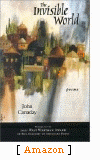|
The poems in The Invisible World grew out of a time I spent living in the Hashemite Kingdom of Jordan, just after the first Gulf War. The shock and awe of cultural displacement provided impetus and occasion for a prolonged exploration of certain gaps and fissures in human experience—or mine, at least—cracks in the selves we painstakingly, unconsciously cobble together each day; between one and another of those patchworks, whose narratives echo but rarely mesh; and among the cultures we populate and promulgate. During that time, I was never quite myself, always something of an actor and, at once, my own most critical audience. At the same time, the desolate, desert landscape coincided with an effulgent human history—the pageant of monotheism acted on an "empty" stage. The relentless sun seemed to lay bare the stage ropes and gripples by which individuals embody their native cultures. Shift a shackle and a new drop curtain might transform the familiar scenario of one’s self. I found myself wondering, more and more, who we are when we’re at home, and who might we be when we’re out? In Seven Pillars of Wisdom, T.E. Lawrence wrote: "In my case, the effort for these years to live in the dress of Arabs, and to imitate their mental foundation, quitted me of my English self, and let me look at the West and its conventions with new eyes; they destroyed it all for me. At the same time I could not sincerely take on the Arab skin: it was an affectation only. Easily was a man made an infidel, but hardly might he be converted to another faith. I had dropped one form and not taken on the other . . . . Sometimes these selves would converse in the void; and then madness was very near, as I believe it would be near the man who could see things through the veils at once of two customs, two educations, two environments." I rarely—of my own volition—lived in the dress of Arabs, if only because I lacked Lawrence’s audacity. But I was called "Orrence" on many occasions, and the sobriquet was more just, in a pacific vein, than I would ever have anticipated. Selves awoke in me I had never guessed at, and others proved ghostly that I had thought solid as the cliffs of Petra. I walked through a world of sand and stone, great volcanic plains and granite inselbergs, and found behind it (or below it, or within—I don’t quite know how or where) a world of apparitions conjured by history, of angels and devils enough to satisfy even Blake’s appetite. And then, perhaps most surprisingly (to me), when I looked inside myself, I found circles within circles of that same invisible world. The Invisible World is my effort to trace a path through that landscape. Poems from The Invisible World
|
Canaday has a jeweler's eye and a piano tuner's ear. Some of his pentameter lines are as lovely as anything attempted in contemporary poetry.
— Eric McHenry [ more comments ]
Poems from The Invisible World
Reviews & Essays Marion Stocking, The Beloit Poetry Journal As a storyteller, the poet admits to a faux self, and I have to admit that even when I suspect I am being manipulated, just as the poet was manipulated by a native acquaintance, he proves so spellbinding a narrator and so skillful with sensuous detail, I hang on every word. I am also seduced by the prosodic skill of these poems: blank verse, heroic couplets dropping off into free verse, a ghazal, slippery rhymes, and WCW's triple-step dance.
[ more ]
Part travelogue, part cultural study, part spiritual autobiography, the metaphysical surge of its thinking flows like a watercourse through reflection, dialectic, meditation; and from its mock-Homeric "entrée" via a twenty-four hour flight to Amman, to the homebound "New England Ghazal" of its ending, its intrepid narrator keeps faith with the spirit of Cotton Mather's Wonders of the Invisible World: "I will venture to say thus much, That we are safe, when we make just as much use of all Advice from the invisible World, as God sends it for."
[ more ]
The book's structure can be conceived as four concentric rings, moving inward from the first section's bewilderment and exoticism towards the third's more mystical themes—a movement towards the "invisible world" of its title. The fourth section is a final movement outward, a kind of leap or jolt out of the sequence's progressive inwardness, into a world that is more grossly physical, less elegant, less refined, a world "unfit for heaven's airy, arid ways." And, strangely enough, this becomes the book's most enduring displacement: the return to a world in which "the senses can bewitch the soul."
[ more ]
Todd Hearon, Bostonia Magazine . . . Canaday exhibits both a developing connection to this new, Middle-Eastern terrain and a lasting communion with the old sod of American literary and religious tradition. (Seen this way, the "invisible world" is also the internal world of the poet's self.) Where else can you find a book of poetry these days dedicated to Jordan's King Hussein and Queen Noor, with an epigraph from Cotton Mather?
[ more ]
|

|
|
|
|




